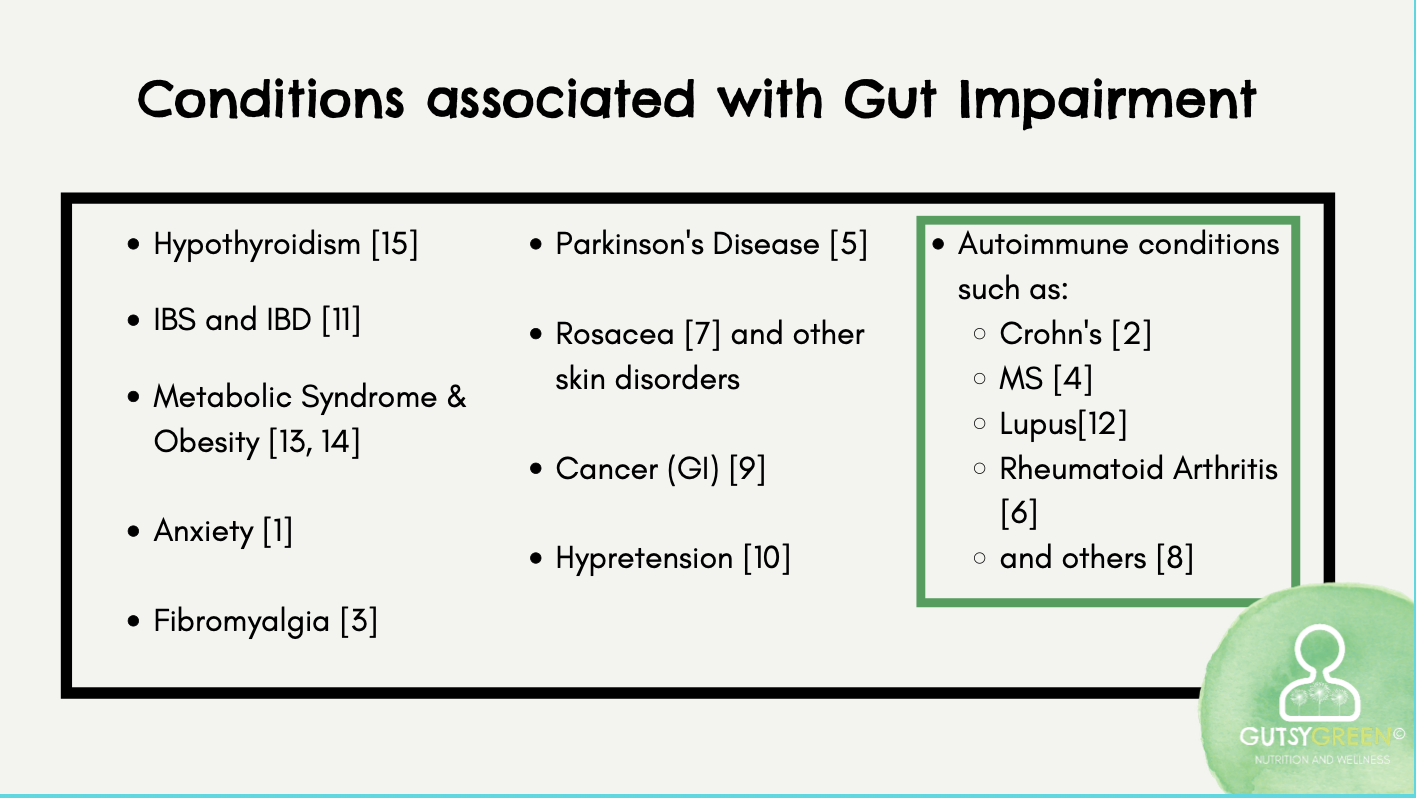(Part 1 of 4) "Gut Primer" video series: The Gut-Immune Connection
Feb 22, 2021This is Part 1 of a free 4-part video series. Part 2 (gut inflammation pathways) is here, Part 3 (how autoimmunity happens) is here, and Part 4 (what to do first for your gut) is here.
Thanks for attending this 4-part video series where we're taking an in-depth look at why you always need to go with your gut when you have immune symptoms.
I consider this series a sort of foundational primer for a successful approach to autoimmune management as well as to all of my other content. So I hope you get a lot out of it - we'll be covering a lot!
Here's what you'll learn in each part of the video series:
-
In Part 2, we'll explore the two gut-related pathways that lead to the vast majority of inflammation in the body: dysbiosis and leaky gut.
-
Next in Part 3, we'll walk through an important research theory linking these gut conditions to the onset of autoimmunity that involves a concept the experts term ‘molecular mimicry’.
-
Finally we'll examine how many practitioners and gut enthusiasts proceed erroneously, and exactly where to focus your attention to make meaningful gains in service of improving your gut health and immune health.
So let's get started with Part 1, on the intimate link between gut health and immune health.
It's prudent to begin by zooming out for a second to examine the landscape here in America.
According to the CDC, as of 2019 1 in 2 people in the US had been diagnosed with a chronic illness. What a mind-blowing stat! Half of us have some kind of underlying condition.

Further, 1 in 5 Americans has an autoimmune condition. Now, this doesn't account for people who are not diagnosed or who may be dealing with immune dysregulation on a smaller scale - many people.

So, no surprise, these are among the highest numbers in the world! Which begs the question, why is this? What makes us, here in America, so susceptible to the onset of autoimmunity? And does its prevalence here relative to other places in the world imply that its onset is at all controllable?
Are there factors that are present in America, that we could potentially manipulate to affect this outcome?
To answer this let's look to my dear friend Hippocrates, who was all about dropping truth bombs back in 400 BCE when we said "all disease originates in the gut." What a smarty-pants!
In recent years, the volume of literature available to us on the profound connection between our digestive health and our general health has exploded exponentially - reinforcing the important role digestion plays as a major driver in disease.
While it may seem that gut health as a scientific concept is relatively new, the truth is that this knowledge is ancient and sacred. We've known the gut's importance, intuitively, for many millennia, but what's so exciting about living right now, in the 21st century, is that we're finally unearthing all of the plausible scientific mechanisms that explain exactly why this is true.
Let's take a moment to define what it is were talking about here when we say gut. What is this charming 3-letter word "gut"?
We mean this to refer to your Gastrointestinal Tract.
The organs that this includes are: the mouth, esophagus, stomach, small intestine, and large intestine or colon.

The Liver, Gallbladder, and Pancreas play secondary roles in the digestive system but are not considered part of the gut.
Often, the word is applied to ONLY mean the intestines, especially in the context of discussing 'gut-health' - this is indicative of the problem with most gut-health protocols, and one that we'll address in this series.
In general, research shows that the gut mediates the lion's share of processes in three major bodily systems.
The first, obviously, is the digestive system. A well working digestive system will properly process the food that we consume to fully nourish our bodies. More on that later.

The second system is the nervous system. The enteric nervous system - or the nervous system associated with the intestines - has often been described as our 'second brain' as it composes more than 30 neurotransmitters such as acetylcholine, dopamine, and serotonin.
Finally, the third system majorly impacted by gut health is the immune system. Let's pause on this last one for a moment.
So listen carefully to this next sentence, because its fundamental to everything else we'll talk about: 70% of our immune cells are located in the gut.
I repeat: 70% of our immune cells are located in the gut.
The intestines possess the largest amount of lymphoid tissue in the body, referred to as (GALT) gut-associated lymphoid tissue, which works to attack and defend us from harmful invaders. This intimate association lends explanatory power as to why when the gut's structures and processes dysfunction, our immune system dysfunctions almost by default.
Let's use a metaphor to better understand this.
Say you have a big corporation that performs many millions of tasks a day.


It employs thousands of workers, in order to function - not unlike our immune system.
70% of the workers come to work every day in the main office building. And the rest work remotely.
But one day the workers arrive to the building to find the offices in terrible condition.
There are water leaks, toxic mold is in the walls, and the building itself is structurally unsound and could crumble at any moment.
You could probably understand that the workers might refrain from doing their jobs and go home, or maybe this environmental stress means they do their jobs in a less effective way, or that they spend their time and energy trying to fix the office problems and not on doing their normal tasks.
The corporation workers here represent the immune system, which cannot function when it's almost completely housed in a damaged gut (or office building). Likewise, if the gut (office building) is in good shape, the immune system (workers) will be free to be more productive and perform their tasks well.
So hopefully this helped to illustrate the gut and immune system's physically close relationship.
Just to really drive this point home, let's take a look at this list, which shows just a few of the conditions that have substantial research linking them to gut dysfunction.
Now if you recall the data from the first slide, you'll notice an eerie parallel here - almost all of these gut-related conditions are the most common chronic conditions that people in America suffer from!

Now it's important to remember when we look at this data, that correlation does not equate to causation - so we don't know if the gut dysfunction in this work is a driver or a symptom.
However, a few of these studies were actually able to examine that for susceptible populations more genetically prone to these conditions, gut dysfunction was present in their bodies before the onset of their condition. This certainly works to support the theory that the gut plays a pathological role in the onset of these conditions.
So if we return to our question from the first slide, which basically asked, "why are Americans more chronically ill than others?" we can see that our health problems here in America, are apparently actually gut problems.
On the right we can also see that autoimmune conditions of all types clearly fall within this category. I've cited just a few of the studies available here, and these are included in an attached handout if you'd like to investigate further.
OK! So that does it for the first part of our 4 part series, that's meant to set the stage and really get your wheels turning about the body's systems being very closely connected here.
In Part 2 we'll get into more of the specifics. See you there!







